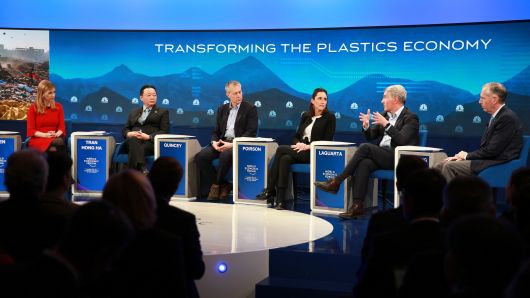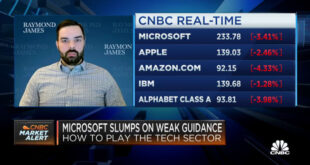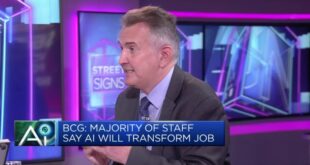
Adam Galica | CNBC
Transforming the Plastics Economy panel with (L-R) Sara Eisen, moderator, Tran Hong Ha, Ministry of Natural Resources and Environment of Viet Nam, James Quincey, Coca-Cola Company, Brune Poirson, Ministry of Ecology, Sustainable Development and Energy of France, Ramon Laguarta, PepsiCo Chairman-elect & CEO, and Jim Fitterling, Dow Chemical CEO.
In a rare show of unity, PepsiCo CEO Ramon Laguarta and Coca-Cola CEO James Quincey discussed during a World Economic Forum panel how their companies are reducing plastic use.
The other panelists — Dow Chemical CEO Jim Fitterling and government officials from Vietnam and France — agree that the plastic occupying landfills and polluting oceans is a problem. But they see different ways to address the issue.
In 2016, 480 billion plastic bottles were sold, with less than 50 percent collected for recycling and only 7 percent turned into new bottles, according to Euromonitor data.
Coca-Cola made 110 billion of those bottles. The company is working toward recovering and recycling the equivalent of 75 percent of the bottles it introduces in developed countries by 2020. Last month, the Atlanta-based company announced two investments in recycling technologies that will allow Coke to use recycled plastics for its bottles more efficiently.
Pepsi is aiming for all of its packaging to be recyclable, compostable or biodegradable by 2025. Most recently, the food and beverage giant has been testing compostable bags for chips in Chile, India and the U.S.
But not everyone sees biodegradable as a viable solution for the world’s plastic problem. Fitterling said that biodegradable alternatives will take much more time because companies must make sure that packaging still serves its original purpose: preserving the food and beverages.
Brune Poirson, the French Secretary of State to the Minister for the Ecological and Inclusive Transition, also noted that degrading plastic can release gases more damaging than carbon dioxide such as methane into the environment.
“We need to stop always thinking alternatives,” she said.
Quincey said they need to think beyond just the recycling and also address every option’s carbon footprint. Producing bottles from polyethylene terephthalate, the plastic commonly used for food and drink packaging and better known as PET, emits less carbon dioxide than making glass bottles or aluminum cans, according to Quincey.
There is also no consensus about whether consumers really care about plastic waste. Quincey said that it differs based on the country, with some recycling more than 90 percent of their bottles and others only 10 percent. Laguarta said that Pepsi is seeing the most concern about the issue from customers with some levels of education and wealth.
“I think companies are ahead of demand,” he said.
Poirson pointed out that rioting political protestors in France, known as Yellow Jackets, included banning all plastic bottles in their list of demands.
 EU News Digest Latest News & Updates
EU News Digest Latest News & Updates



